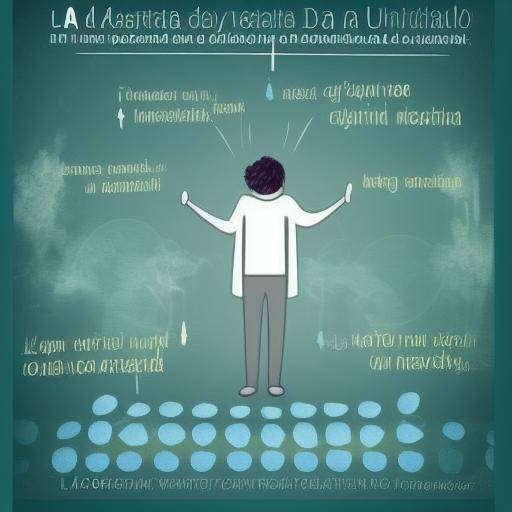
Procrastination is a common obstacle that affects many people in their daily lives. It is often associated with the lack of self-discipline, the inability to manage time effectively and, in many cases, the tendency to postpone difficult or unpleasant tasks. In turn, self-pity is a powerful resource that can help overcome procrastination and foster a positive mentality. In this article, we will explore the importance of self-compassion in the fight against procrastination and how our daily lives can positively impact.
History and background
Self-compassion is a concept that has been studied in various disciplines, including psychology, philosophy and spirituality. Its roots go back to ancient Buddhist teachings, where the importance of compassion towards oneself is emphasized as an integral part of emotional and mental well-being. Throughout history, different philosophical and psychological trends have addressed self-compassion from different perspectives, recognizing its relevance in the development of resilience and self-esteem.
Benefits of Self-Compassion
Self-compassion has been associated with a series of mental and emotional health benefits. Scientific studies have shown that people who practice self-compassion tend to experience lower levels of anxiety, depression and stress. By cultivating compassion for oneself, it promotes greater satisfaction with life, a healthier self-esteem and a more positive attitude towards everyday challenges and difficulties.
Challenges and Overcoming Procrastination
Procrastination, on the other hand, has been the subject of attention in the field of behavioral and organizational psychology. It has been identified as a behavior that can lead to anxiety, stress, feelings of guilt and decreased academic or labor performance. Traditional strategies to overcome procrastination tend to focus on time management, planning and setting goals. However, self-pity offers a new perspective in the fight against this harmful habit.
Deep analysis
Rol de la Autocompasión en la Superación de la Procrastinación
Self-compassion is presented as an emotional resource that can modify the way we approach procrastination. By cultivating compassion for oneself, it promotes acceptance of its own difficulties and limitations, fostering a more compassionate and less self-critical attitude. This perspective allows us to address the tasks of an open and understanding mentality, rather than resorting to self-criticism and self-requirement, which tend to feed the cycle of procrastination.
Positive Mentality and Self-Compassion Culture
Maintaining a positive mentality is fundamental in the process of overcoming procrastination. Self-compassion, fostering a compassionate attitude towards oneself, contributes to the development of a positive mentality. By relieving self-criticism and self-imposed perfectionism, space is opened for a more realistic and constructive vision of its own capacities and limitations. This, in turn, facilitates the adoption of productive strategies to deal with outstanding tasks, without falling into the trap of self-requirement.
Statistics and case studies
Recent studies have shown that, by incorporating self-compassion into the process of overcoming procrastination, significant improvements are observed in time management, productivity and emotional well-being. Cases of individuals who have adopted self-compassion as a tool for dealing with procrastination demonstrate the effectiveness of this strategy in everyday life, both at personal and professional levels.
Best practices and practices
Self-compassion is not limited to the personal sphere, but also finds applications in labour, educational and therapeutic contexts. In working environments, fostering a climate of self-compassion can help reduce labour stress, strengthen teamwork and improve employee participation. In the educational field, promoting self-compassion among students can foster a more inclusive and empathic learning environment, promoting emotional well-being and academic performance. In the therapeutic field, self-compassion has also been integrated as an effective tool in the treatment of anxiety, depression and post-traumatic stress disorders.
Expert opinion
Experts in psychology and personal development agree that self-compassion is a key component in the process of overcoming procrastination. Respected psychologists and trainers have stressed the importance of cultivating self-compassion as a way of freeing themselves from paralyzing self-criticism and adopting a more realistic and constructive perspective against difficulties. These opinions support the relevance of self-pity as an integral approach to addressing not only procrastination, but also several daily challenges that affect emotional well-being and productivity.
Comparative study
Autocompassion vs. Procrastination Traditional Reform Strategies
By comparing self-compassion with traditional procrastination overcoming strategies, it is observed that while both perspectives can be complementary, self-compassion stands out for its holistic approach, which encompasses emotional and cognitive aspects, in contrast to an exclusively pragmatic and behavioral approach. While traditional strategies tend to focus on time management, planning and self-regulation, self-compassion offers a deeper aspect of the individual as a whole, addressing their emotions, beliefs and self-care.
Positive Mentality vs. Autocompassion
The relationship between self-pity and the positive mentality is narrow, as both perspectives seek to promote a healthier and more constructive attitude towards the challenges of life. However, the positive mentality tends to focus on the power of positive thinking and the visualization of goals, while self-pity focuses on the compassionate acceptance of difficulties, fostering self-reflection and emotional self-regulation. Both perspectives can coexist and complement each other, generating a balance between the positive motivation and the compassionate understanding of oneself.
Practical advice and actions
Strategies to cultivate self-compassion and overcome procrastination
- Practice full attention (care) to develop the consciousness of self-critical thoughts and encourage compassion towards oneself.
- Integrate self-care as a priority, recognizing the importance of addressing emotional and physical needs.
- Practice cognitive restructuring to transform negative thoughts into a more compassionate and realistic perspective.
- Establish realistic and flexible goals, accept their own limitations and develop a compassionate approach to challenges.
Concluding reflections and recommendations
Self-compassion emerges as a fundamental tool in the fight against procrastination, offering a compassionate and realistic approach to addressing everyday difficulties and challenges. By cultivating self-compassion, not only facilitates the overcoming of procrastination, but also promotes a deeper sense of well-being, self-acceptance and emotional understanding. Considering self-compassion as an integral part of the process of overcoming procrastination can mean a significant change in the way we face the challenges of everyday life, fostering a more resilient mentality and a compassionate attitude towards ourselves.
Conclusions and FAQs
Conclusions
In short, self-pity emerges as a powerful resource in the fight against procrastination, promoting a compassionate and realistic attitude towards oneself. This comprehensive approach not only contributes to overcoming procrastination, but also promotes greater emotional well-being and a more positive mentality. By cultivating self-compassion, understanding of one's own limitations is strengthened, compassionate acceptance is encouraged and more effective strategies are made available to address everyday challenges.
Frequently asked questions
1. Is self-pity synonymous with indulgence or lack of responsibility?
Self-compassion does not imply the lack of responsibility, but the compassionate acceptance of one's own limitations and difficulties. By cultivating self-compassion, a realistic and proactive attitude towards self-care and overcoming challenges is promoted.
2. How can I integrate self-compassion into my daily life to overcome procrastination?
Practice full attention, cognitive restructuring and self-care are effective strategies to integrate self-compassion into your everyday life. Recognizing your own limitations and fostering a more compassionate attitude towards yourself can contribute significantly to overcoming procrastination.
3. What is the relationship between self-pity and emotional resilience?
Self-compassion and emotional resilience are closely related, as both perspectives promote a more compassionate and resilient attitude towards adversities. Cultivating self-compassion can strengthen emotional resilience, foster greater emotional well-being and greater ability to cope with challenges.
4. Is it possible to learn to be self-compasive if I am not natural?
Yes, self-compassion can be cultivated through conscious practices such as meditation, self-care and cognitive restructuring. Through continuous practice, it is possible to develop a more compassionate attitude towards oneself and overcome paralyzing self-criticism.
5. Can self-compassion be applied in working or educational settings?
Yes, self-compassion has applications in various contexts, including work and educational environments. Promoting a climate of self-compassion can promote a more empathic and productive environment, contributing to emotional well-being and overcoming procrastination.
6. What is the long-term impact of self-compassion on the overcoming of procrastination?
The long-term impact of self-compassion on the overcoming of procrastination is manifested in a greater capacity to face challenges, a more compassionate attitude towards oneself and a more positive mentality. Cultivating self-compassion can generate significant changes in the way we face everyday challenges, promoting greater emotional well-being and greater productivity.
In conclusion, self-pity plays a key role in the fight against procrastination by promoting a compassionate and realistic attitude towards oneself. Integrating self-compassion into everyday life can mean a significant change in how we address challenges, fostering a more resilient mentality and a compassionate attitude towards ourselves.





















